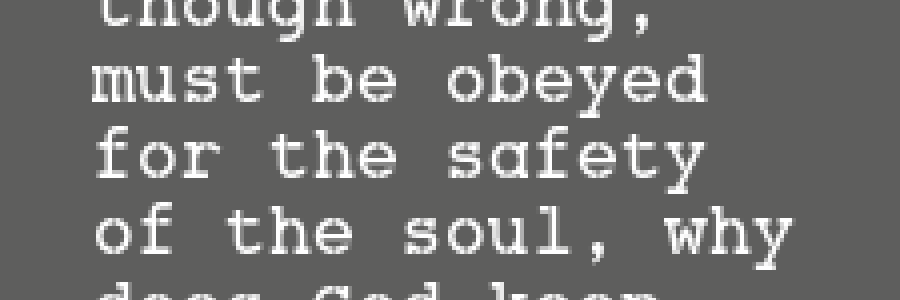Joining the AARP: Right or Wrong?
Poll Results
Joining the AARP: Right or Wrong?
Wrong Votes: 2
Right Votes: 0
Meh Votes: 6
Discussion
Who Are the "Weak in Faith?" (Part 5)
(Read the series.)
The Meaning of “Weak In Faith”
We have been examining the “weak” of Romans 14:1, finding him to be more honorable and biblical than his description, “weak in faith,” would suggest. Here, we will turn to the term “weak in faith” and see a way of interpreting it that fits better with everything else we read about this brother.
Discussion
From the Archives: Argue Like a Saint
Verbal communication is one of God’s favorite inventions. He created speaking beings in His image and then spoke to them. Over the millennia, He gave visions to prophets and commanded them to speak or write what they had seen. And He inspired select prophets to write His words as they were moved by the Holy Spirit. He gave us a book.
So whenever we use words, we’re doing something of personal importance to God. And since we believers are at peace with God through Christ and represent God to a world that does not know Him, our writing and speaking carry that much more importance.
We should not be surprised, then, that Scripture has so much to say about how we use words. And we should attend energetically to how that instruction applies to posting in Internet forums.
Discussion
"Spiritual disciplines don’t seem passive when your alarm sounds at 5:30am for a pre-work prayer time"
Body
“[O]ur Bibles don’t read themselves, our prayer times don’t come pre-scheduled in our calendars, and our fasting, memorization, or meditation doesn’t occur spontaneously without our concerted effort.” Sweaty Sanctification
Discussion
Who Are the "Weak in Faith?" (Part 4)
(Read the series so far.)
We need to examine a few miscellaneous verses. Some of them seem to suggest Paul is on the side of the strong. These need explanation. Paul isn’t “on” either side. Others, on closer examination, suggest that he is on the side of the weak.
Romans 14:14 begins, “I know and am persuaded in the Lord Jesus that nothing is unclean in itself.” Some take this to mean that Paul “knows” the weak brother is wrong. But Paul is not saying that. He says nothing is unclean “of itself.” In other words, things are not intrinsically sinful. But our applications of God’s principles and our motives can still make them unclean. The context of v. 14, before and after, is the importance of taking seriously the convictions of the weak and not causing him to disobey them. Therefore, contextually, the point of v. 14 as a whole is to express why these things are sinful to the weak.
Discussion
Nevada Allows, Colorado Denies Christian School Vouchers
Body
“School voucher programs, in which parents use public funds to educate their children at private schools, are on a roller coaster this summer.”
Discussion
“Global warming really has become a new religion”–Nobel Physicist Ivar Giaever
Body
“’It’s ridiculous,’ he says, to think we can measure global average temperature (GAT) accurately, and that we should consider an increase in GAT from ~1880 to 2015 from ~288 degrees Kelvin to ~288.8 degrees Kelvin (an increase of only 0.3%) frightening.” More on Giaever’s video lecture.
Discussion
Legalism & Galatians Part 2: Law, Liberty & The Flesh
In a previous post, I asserted that popular confusion about law, grace, and the Christian life is often partly due to misunderstanding what was happening in the Galatian churches and what Paul taught to correct it. I argued that the Galatian trouble centered on their understanding of justification and its relationship to Mosaic Law, and that they were led astray by unbelievers who, in reality, cared as little for the Law of Moses as they did for the gospel.
Seen in this light, the epistle does not encourage sweeping rejections of effort and struggle in the Christian life, nor does it provide a basis for excluding firm boundaries against sin (often termed “man-made rules”) in Christian living.
But loose ends remain. Further study of the letter not only resolves the remaining issues but also clarifies common points of confusion such as the distinction between conscious self-discipline vs. “the flesh” (or the non-biblical term, “self-effort”) and the difference between slavery to the Law vs. obedience to Christ.




Discussion